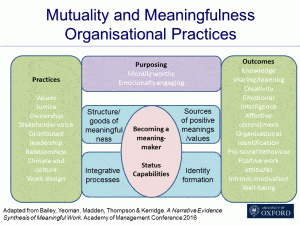Meaningfulness and Mutuality – design principles for organisations and systems
Organisations are being challenged regarding their contributions to society and the natural environment – contributions which managers and employees frequently want to make, but which require innovation in their business models. When driven by a mix of financial, social and environmental objectives, organisations find themselves working in complex systems with stakeholders who hold diverse values about work and life. These stakeholders include investors, employees, suppliers, communities and even competitors.
Meaningfulness and mutuality are key to designing organisations capable of managing complexity, fostering innovation and encouraging stakeholders to co-create value. Such principles help us answer questions, such as: why are we here? what matters to us? what do we care about? how are we to live together? They bring to light under-explored motivations for collective action, such as the need for meaningfulness and the common good in organisations and ecosystems.
The purpose of the common good is to create the conditions for promoting life and flourishing. Producing the common good is a type of value creation which involves stakeholders working together in relational complexity. Generating new knowledge, and innovating in emerging industries depends upon shared activities and mutual gains which include competitors, suppliers and customers. In commodity markets (for example, tea, cocoa or cotton), elevating whole supply chain value may even extend to corporations playing a role in governance and community development. This triggers a further set of questions, such as: What is the responsible connection of business to society? How do we harness corporate power for the benefit of all? Or ensure that the contributions of stakeholders to producing value will be fairly rewarded and properly esteemed?
Meaningfulness and mutuality are design principles for producing the business models capable of addressing such questions. I will be developing this idea through this website and in my forthcoming book for Routledge called Ethical Organising: Meaningfulness and Mutuality in Organisation/System Design
